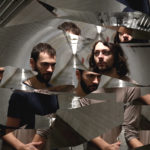With a Grammy award and considerable artistic and critical acclaim to his name, RAC has already enjoyed a decade of considerable success, success which looks set to continue with the release of his new album ‘BOY‘, scheduled to drop next month. Ahead of its release, he spoke to GIITTV about his latest single, his artistic inspirations and the impact the Corona Virus is having on his plans.
You currently reside in Portland, Oregon but were born and raised in Portugal. How do think being raised in such a cultured country impacted your love for the arts and would you say your home country is and was an inspiration when it came to you considering a career in music?
I definitely appreciated growing… well I take that back. I didn’t appreciate growing up there, I didn’t really enjoy it that much. In hindsight, it’s a beautiful amazing country, but as a teenager, I actually didn’t care and wanted to get out as quickly as I could. Obviously, it is quite cultured, so a lot of that inevitably rubbed off on me, definitely, my appreciation for music started there. It’s hard to compare it to any other situation because you only have one life experience of growing up somewhere. I can imagine what it would be like somewhere else, it kind of is what it is. Despite living in Portugal, I still chose to pursue music; there’s a lack of music industry there, it’s extremely small and definitely not enough to make a living, so that was part of the reason why I moved to the US; partially because I have dual citizenship but also just to go to college and get a music degree. That was kind of the main reason why I moved.
Who were your artistic influences growing up and have they changed much at all over the years?
My influences have changed and morphed over the years. It’s funny because I don’t really look at other artists for influence. I definitely love music and I love hearing other people’s take on it, but I don’t listen to an artist and think, “Oh I want to do that.” It’s mainly more like I get their feeling or whatever they’re trying to get at, they’re trying to emulate that, but never the sound or anything. Inevitably, I end up sounding like some other people sometimes, but that’s just natural, that’s not intentional in any way. I think Mike Patton is somebody that comes up for me quite a bit early on, I love how eclectic his career is and he’s done everything from soundtracks to Italian pop songs to metal and everything in between. I really appreciate his music, I think he’s one of a kind and I think a lot of people, they only know one or two things he’s done and when they discover the rest, okay this guy is legit.
How does having two ‘cultures’ so to speak behind you now, if at all, impact or influence the music you make? What’s the key motivation that gets you into the studio and to share your creations with the world?
It’s kind of going back to what I was saying earlier, I only know my own experience so it’s really hard to say where all of this is coming from. Obviously, it had some impact on me but it’s hard to pinpoint exactly where. There are times when I play guitar I’m like, “that’s kind of sounds like Portuguese music or Brazilian music,” But it’s not something I actively think about or really focus on at all, just sort of what comes out. So much of this is really sitting down and seeing what comes out, there’s really no grand vision for this, it’s all very natural. The key motivation is I love doing it, even though I’ve been doing this professionally since 2007 really, I still wake up in the morning and I still want to work on music. I really enjoy the craft and everything behind it, I love the process. I actually prefer the process of recording, versus the end result, I love that creative flow.
Is there a story behind your latest single “Stuck on You”? How did you come to collaborate with Phil Good on the song?
I feel like there used to be a time where somebody would go in the studio and work together and we’d come up with songs on the spot. So much of this stuff nowadays is done remotely and very impersonally, which leads to not having these great, grand stories behind it. It’s just like “Hey, we worked on a track,” and that’s basically what happened! Not to say good art can’t come from that kind of situation, but it’s just not that exciting to talk about. But I will say, Phil, well Jared – his real name – is an amazingly talented person. I think this one originally started with something he came up with. He had a basic idea of the song and I took that and added some stuff to it, then we worked back and forth and eventually sort of landed where we did. Which is a bit atypical for me, so maybe that’s something unique about this song. The hook was already written as opposed to starting from my own tracks. At some point in time, Jared’s family is up here in Portland, we met up here and we worked on the song in my studio together to finish up, add some final vocals, things like that.
The track is taken from your upcoming album, ‘BOY’, out on May 8th. Without giving too much away, what can you say about it?
‘BOY’ is essentially based on my childhood. I grew up in Portugal to a missionary family, it was a weird upbringing; I went to 13 different schools growing up, we moved around a lot within the country, moved back to the US for a period. Again, it wasn’t bad, it was just an interesting, unique upbringing. When I was writing the album, I kept on tapping into that period of my life and by the 5th or 6th demo I wrote, it was pretty clear that my childhood was going to be a theme and I decided to lean into it and basically channel as much of that as I possibly could. From that 4th or 5th, 6th demo or whatever it was, the next fifty were about the initial spark. I think it’s a youthful album, it’s very nostalgic for me personally, I don’t know if other people can relate to it, but it was definitely about a period of my life, if that makes sense.
Do you have a favourite track on the album or does it tend to change?
I have a couple of personal favourites, I wrote so much for this so inevitably the songs that are on the album are my favourites already. I threw away quite a bit of material that didn’t quite fit. If I had to pick one, I’d maybe go with ‘MIA’, the track I did with Danny Dwyer, that one sticks out to me mostly because I wrote that chord progression when I was probably 10 years old!
You’re perhaps best known for your remixes, and have more than 200 under your name to date. If you had to choose, is there one in particular you’re especially proud of or impressed with how it turned out/how people reacted to it?
There’s a couple of highlights, the first one being The Shins, that really set the tone early on, I got kind of lucky with that one. Edward Sharpe is another one that connected pretty well. I mean it’s funny with the Lana Del Rey one because when I did it, Lana Del Rey was virtually unknown and I’m in no way taking credit for that, but it was kind of fun to be a part of that world before it took off. The same thing happened with Foster The People – again not taking credit – it was kind of right place right time, I happened to do a remix before they blew up and I got to ride that wave. There’s been a couple of other situations like that where people were maybe a bit buzzy, three months prior when I actually do the remix. In those 3 months of me doing the remix and it coming out, sometimes a lot of stuff can happen, someone’s career can really take off. I remember that happening with K. Flay, on the last album, she already had a lot going on but in between the time when we wrote the song from my album EGO, and then released it, her career took off and deservedly so. It’s been awesome to see.
To what extent did winning a Grammy, for Remixed Recording, in this case of “Tearing Me Up” by Bob Moses in 2017 impact your career?
It changed everything. After I won, one of the first things my manager told me was “Well that’s one for the obituary!” It’s pretty true, it follows you everywhere, no matter what I do for the rest of my life, it’s always going to be, Grammy Award-Winning blah blah blah. So again, it’s a great thing, I think it’s awesome it opened so many doors, I’ve definitely taken advantage of that. Suddenly my parents’ friends understand what I do, it’s definitely a life-changer. There was another aspect of it that was very unexpected, which is that I became the first Portuguese person to ever win and I think still to this day, I’m the only winner. So it’s kind of wild to be representative of an entire country. But, I appreciate it and I’ll keep working as hard as I can!
Do you care much for critical and artistic acclaim like that or are you more someone who just makes music because they enjoy it and hopes for others to like it too?
I think some people maybe share the sentiment, I do this purely for myself and I’m not ashamed to say that, but that’s my method because if I can make myself happy basically, then usually other people latch onto that. At least that’s been my ethos my entire career, well if I’m happy with it, even if other people don’t get it or don’t like it like I’m happy with it so it’s just a matter of taste you know? Okay, they don’t like it, it wasn’t like because I slacked off or because I was trying to sound like somebody else, I was actually being honest and real. I can’t fault people for not liking that but if I try to imitate something and it connects, that’s annoying because then I just sound like somebody else. Or if you to sound like somebody else and it doesn’t do well, then you’ve just wasted your time and devalued your brand basically. I think it’s incredibly important to do your own thing and defiantly so, against your fans wishes and granted I feel have a very loyal fan-base that really supports me and everything I do, even the weirder projects, I really appreciate that. I’ve always been pretty honest about where my motivations lie – I need to do this for myself, it’s more like, “trust me, If I’m happy with it, I think you will be too.” So that’s my approach to it. I don’t really like the idea of catering to other people, that sounds suffocating!
What’s the nicest thing anyone has said or written about you, and how do you handle any negative comments that might come your way, especially in this age of social media and connectivity?
It’s very rare for me to get any hate. I think because I’m not wildly popular, it’s definitely like a niche thing. It’s pretty rare for me to get some really hateful comments, I definitely don’t mind criticism. It’s kinda going back to the last question, where because my baseline is, “Well am I happy with it?” if I’m happy with it, it doesn’t matter what other people think you know? It really doesn’t. Negativity sort of bounces off of me, I’m just like, “Well you didn’t get it, or you didn’t like it and that’s fine. I didn’t really do it for you anyway!” It doesn’t really affect me that much.
Has the Corona Virus outbreak affected any of your plans for the rest of the year, such as any performances you might have had lined up, and if so, have you started thinking up ways to fill in or use that time positively in terms of your life and career?
Yes, I guess depending on when this comes out, we might have backup dates already but we have a US tour starting end of May through June and July. We’re kind of in a waiting holding period with everybody else, we’re not really sure if this is going to be cleared, probably not. So we’re just preparing either way, it would never be cancelled but it would definitely be rescheduled. So that’s where we’re at, the coronavirus has basically impacted the entire music industry, the entire model has completely broken and I mean there’s stuff that me and many, many other artists have been talking about for a long time, we’re all far too dependent on live music and when that goes away, the entire music industry falls apart so now we’re scrambling.
In the past couple of years, I’ve made the effort to diversify my income, so I’m not really getting hit as hard as some other people but yeah it’s still not great. It’ll be interesting, I’m personally attempting the Patreon model right now, so more focusing on subscribers and things like that where you focus on a smaller group of people, but the financial income is there to support that. With that should be a really positive thing, because then I’m not working for the mass audience, I’m working for a much small, niche audience. I’m into that.
Finally then, music has survived through the ages when many other industries have fallen by the wayside and you’ve been in the industry now for over a decade, no doubt having seen for yourself many highs and lows, but where do you see it going in the next ten years? Do you think, as many artists do, that music will be one of the few things that will truly live forever, and if so, how/in what forms do you most see that happening?
Music will definitely be around forever, it’s sort of already been around forever. The fact that it’s stuck around forever when there wasn’t a recording medium for the vast majority of it, is kind of impressive. Humans tend to like to hit things and make sounds, at some point harmonise, so I think that’s not going anywhere. I think the formats will change you know, maybe music will become more interactive in the future, I don’t know. Maybe this idea of a static piece of music will go away, but I think there’s something intangible about music because it’s a form of communication and I think that will always be present. Even if it’s at the very worst it’ll be associated with a different medium, so attached to a visual medium or something like that. But for the most part, it’ll always be around.
It’s funny because I entered the music industry in 2008, literally the worst time since the Great Depression and somehow I’ve made it, so I feel sort of resilient like I can make anything work, even if this COVID thing ends up being worse, I can handle myself, I’ll be fine. We’ll figure it out as an industry. Fortunately, with the internet, we’re able to bypass a lot of the big players and create our own ecosystem. If the mainstream ecosystem isn’t working for musicians, something else will pop up, that’s just how it works. We don’t have to really rely on the major label system to agree on certain royalty rates or anything like that, I think there’s all kinds of new models, I’m actually quite optimistic. Obviously in the short term, things are going to take a hit, but yeah I don’t think music is going anywhere.




